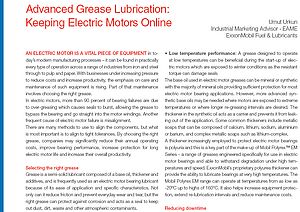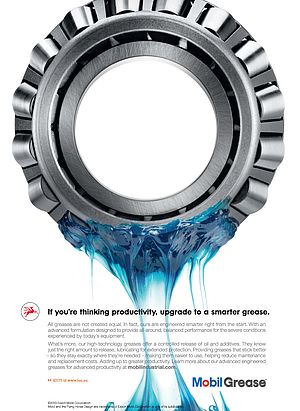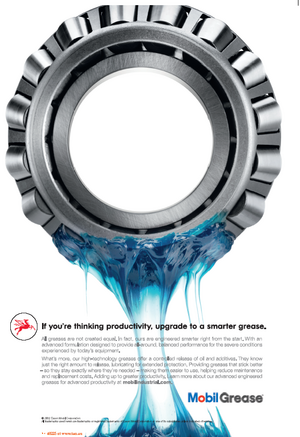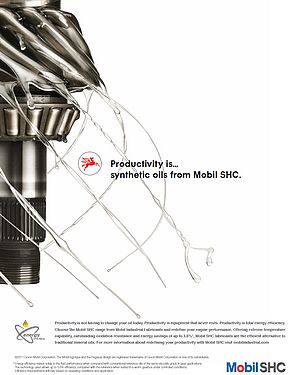At every major track and field event, the 100 metres sprint is usually the most spectacular competition, since it determines the fastest man in the world. However, exactly 100 years ago, King Gustav V of Sweden realised that the real athletic champion is to be found somewhere else.
At the Stockholm Summer Olympics in 1912 he told Jim Thorpe, winner of the decathlon: "You, sir, are the world's greatest athlete". What King Gustav V recognised was Thorpe's achievement in being the most versatile athlete of all - after having achieved the best result in all ten disciplines combined. What is true in the world of sports also applies to industrial lubricants.
Increasing global competition and maintaining an edge on competitors are paramount concerns in today's global manufacturing marketplace. Yet being ahead of competitors on a sustainable and enduring basis is a complex challenge. Rather than focussing exclusively on the maximum output of production machinery, being successful today means taking into account the whole lifetime of a machine. Total Cost of Ownership (TCO) is the term commonly used in this respect.
Companies must deal with the maintenance challenges that are often associated with today's industrial machinery, seeking new ways to enhance their overall energy efficiency, reduce energy costs, increase productivity and remain committed to sustainable practices.
Successful machine builders as well as operators increasingly view preventive and predictive maintenance as investments to help ensure long-term success, and choosing the correct lubricants is the most fundamental component of a successful, preventative maintenance programme. The increasing recognition that conventional, mineral-based lubricants are limited in their capabilities means operators are evaluating and improving equipment performance and reliability with the use of high-performance, synthetic lubricants and related support services.
Synthetic lubricants - decathletes forindustrial machinery
Instead of using a 'sprinter' oil, which may be able to perform well in one area, companies that want to be successful in the long run have come to use 'decathlete' synthetic oils. By definition, 'decathlete' oils are lubricants which excel in all critical areas of lubrication and can consequently offer both productivity and energy efficiency benefits.
For example, the Mobil SHC brand of high performance lubricants meets 'decathlete' performance status, thanks to ExxonMobil's Balanced Formulation Approach to lubricant development. This approach selects advanced technology base stocks and carefully designed additive packages to complement the excellent lubrication properties of base fluids to develop lubricants with decathlete qualities, achieving a high level of performance that extends across all critical areas of lubrication including:
• wear protection
• oxidative stability
• viscosity index and shear stability
• air and water tolerance
• rust and corrosion control
• filterability
• extreme temperature performance
• seal compatibility.
Synthetic gear, circulating and bearing oils
The next generation of Mobil SHC 600 highperformance synthetic gear, circulating and bearing oils, is the latest product launched by ExxonMobil that includes a balanced formulation designed to help optimise 'overall' performance.
As part of the research and development programme for the product, ExxonMobil undertook a series of standard tests to assess the 'overall' performance of the next generation Mobil SHC 600 Series against other synthetic gear oils available in the marketplace. While Mobil SHC 600 oils delivered exceptional performance across all critical areas, other oils had mixed results as depicted in the spider diagrams below.
Performance in the Field
The balanced formulation of Mobil SHC 600 oils has recently led to Smurfit Kappa, one of the world's leading producers of paper-based packaging, achieving an impressive reduction in energy consumption. The company has reported a gearbox energy efficiency saving of approximately 6.5 percent, following a field trial using the new Mobil SHC 600 Series.
Significant other benefits brought about by the lubricants include outstanding low temperature fluidity to enable start up and operation at low temperatures, and excellent resistance to rusting and corrosion for enhanced equipment protection.
It's not just Mobil SHC 600 which delivers a competitive edge to industrial companies. Plastic pipe manufacturer Ostendorf used the Mobil SHC Gear Series, a fully-synthetic industrial gear oil, and improved the energy efficiency of an extruder by an average of 3.3 percent while extending oil drain intervals (compared to the existing lubricant being used, a competitor's mineral ISO 220 gear oil). Furthermore, the average extruder gearbox temperature was reduced by 5°C, helping to reduce unscheduled downtime and component wear, and in turn improving performance.
The Mobil SHC Gear Series demonstrates excellent water-handling properties, enhanced resistance to micropitting fatigue, improved seal compatibility and outstanding shear stability.
Conclusion
In order to remain competitive in the market, manufacturing companies can no longer afford to use lubricants which do not optimise the performance of their business. Since maintenance and energy costs have become key elements to economic success, smart industrial players have come to use synthetic oils and greases that provide multiple performance benefits, which include extending the lifetime of their machinery. Or, in other words: they rely on the 'decathletes', not the 'sprinters'.






























